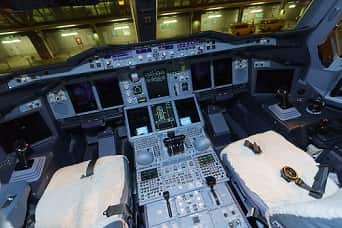Aircraft Mortgages
STA's team of aviation lawyers discuss the technical aspects surrounding aircraft financing, mortgages, governing law and court precedents under global context.
An economy's financial markets are critical to its overall development. Banking systems and stock markets enhance growth and development, the principal factor in poverty reduction. A well-developed and supported financial system should improve the efficiency of financing decisions, favoring a better allocation of resources and thereby economic growth. Likewise, planned legal reforms play a pivotal role in the overall development of financial markets. Economic growth, in other words, is conclusively linked to i) cost reduction; ii) increasing the availability of finance, and iii) promoting economic restructuring[i]. This effect is greater for those players who rely heavily on external financing as against resorting to retained earnings[ii]. The aviation sector is a perfect example of this kind of industry players. Aircraft financing has evolved (especially) over the last decade. What used to be gasconade of super wealthy in the past is today no longer deemed alluring extravagance.
A careful, well-planned and structured framework for secured transactions reflects a crucial step in improving access to credit and increasing credit for financing equipment. Aircraft financing can be complex on account of varied reasons. These include i) the fact that aviation industry is heavily regulated; ii) conflict or incompatibility of laws in foreign countries compared to domestic regulations thereby creating enforcement problems for secured creditors; iii) ownership and registration provisions (see below), and iv) operating restrictions to name a few. The Blue Sky case and issues raised due to the choice of law is only a tip of an iceberg, and there are various other aspects that a lender must consider while entering into aircraft mortgage. To repossess the aircraft on default of payment by preventing de-registration from the jurisdiction where the aircraft operates is the key function of the Mortgage. Despite the fact that attempts have been made to protect the rights of financiers at international level by Cape Town Convention; there still exists - a lacuna due to the contradictory lex registry or differences in local law mortgages.
 The Chicago Convention of 1944 on International Civil Aviation (the Convention) deals with registration of civil aircraft (and; not state aircraft). The United Arab Emirates accessed the Convention on 25 April 1972 and South Sudan is the latest entrant as of 11 October 2011. In 2013, the President of the ICAO Council invited Taiwan to participate in the 38th ICAO Assembly, but Taiwan has not yet formally accessed the Convention. Article 18 of the Convention proscribes aircraft from registering in more than one state, and further Article 19 sets out that registration of aircraft in any state shall be by such state’s laws and regulations. In the United Arab Emirates, the UAE General Civil Aviation Authority (the GCCA) issues timely ‘Civil Aviation Advisory Publication' (the CAAP) outlining Guidance on Aircraft Registry Requirements. The CAAP applies to all UAE operators and persons or entities holding legal interests in registering or de-registering civil aircraft in the UAE Civil Aircraft Registry, as well as entities that require registering interests on International Registry in Mobile Assets for which the UAE is the State of Registry. In contrast, in the UK an aircraft register is maintained to record names of operator or charterer by demise (for instance, lessee of aircraft) and the United States supports registration of owners which is limited to US Persons or entity. The Convention has had a bearing on Blue Sky One Ltd & Ors v Mahan Air and another[iii] (the “Blue Sky case”).
The Chicago Convention of 1944 on International Civil Aviation (the Convention) deals with registration of civil aircraft (and; not state aircraft). The United Arab Emirates accessed the Convention on 25 April 1972 and South Sudan is the latest entrant as of 11 October 2011. In 2013, the President of the ICAO Council invited Taiwan to participate in the 38th ICAO Assembly, but Taiwan has not yet formally accessed the Convention. Article 18 of the Convention proscribes aircraft from registering in more than one state, and further Article 19 sets out that registration of aircraft in any state shall be by such state’s laws and regulations. In the United Arab Emirates, the UAE General Civil Aviation Authority (the GCCA) issues timely ‘Civil Aviation Advisory Publication' (the CAAP) outlining Guidance on Aircraft Registry Requirements. The CAAP applies to all UAE operators and persons or entities holding legal interests in registering or de-registering civil aircraft in the UAE Civil Aircraft Registry, as well as entities that require registering interests on International Registry in Mobile Assets for which the UAE is the State of Registry. In contrast, in the UK an aircraft register is maintained to record names of operator or charterer by demise (for instance, lessee of aircraft) and the United States supports registration of owners which is limited to US Persons or entity. The Convention has had a bearing on Blue Sky One Ltd & Ors v Mahan Air and another[iii] (the “Blue Sky case”).
This article is structured to reflect the considerations that aircraft financier must deliberate on and consider while structuring the aircraft mortgage transaction:
1. Ownership Provisions
Adequate planning and initial diligence are important in establishing and determining aircraft ownership. Private jets and charter flights are registered in individual names or under the name of a special purpose vehicle (the SPV) or free zones. The laws vary significantly in different jurisdictions when it comes to ownership as discussed above. In India for instance, registration of such aircraft under an off-balance sheet vehicle such as overseas SPV is unlikely to be accepted. Likewise, the Federal Aviation Administration in the United States registers and hangars aircraft in the name of US Persons or US entities. Non-US owners are required to appoint a trust company, and such trust will hold the title to and in the aircraft on behalf of such foreign owners. In the case of true lease form of arrangements, the lessor must be identified and registered as the proprietor on FAA’s register.
In the event where the lease does not constitute a true lease, the registered owner shall be the lessee. This gets more complex when dealing with mixed-use leases as FAA may raise a concern and treat such mixed-use as a conditional sale. In the case of mixed-use and based purely on the author’s experience, it is advisable to obtain a written opinion from FAA’s legal division before closing.
In cases where aircraft are registered under an SPV, the SPV will enter into the security financing documentation which typically includes an aircraft sale and purchase agreement, a loan facility agreement and security documentation. The security package must include:
-
 An aircraft mortgage which shall give the financier inter alia the right to sell the aircraft on default by way of security over the aircraft. As mentioned above, it may not be possible to take local law mortgage over an aircraft as the same is not recognized in any form as a valid type of security in some jurisdictions such as Belgium. In such countries, a financier must consider other forms of security interest and effectiveness of such arrangement to protect its rights. Failing to locate some arrangement protecting the enforcement of security interest, one must refrain from financing for the transaction involving countries having ambiguity over the enforcement right of security interest;
An aircraft mortgage which shall give the financier inter alia the right to sell the aircraft on default by way of security over the aircraft. As mentioned above, it may not be possible to take local law mortgage over an aircraft as the same is not recognized in any form as a valid type of security in some jurisdictions such as Belgium. In such countries, a financier must consider other forms of security interest and effectiveness of such arrangement to protect its rights. Failing to locate some arrangement protecting the enforcement of security interest, one must refrain from financing for the transaction involving countries having ambiguity over the enforcement right of security interest;
- The loan agreement with SPV guarantee from the parent company or beneficial owner as guarantor is prudent. Such a guarantee is to ensure remedy against the ultimate beneficial owner of the SPV which is usually a limited liability entity or high net worth individual. This will ensure SPV’s co-operation to realize financier’s security over aircraft. Further agreements include multi-party agreements or security assignments of the SPV’s and/ or operator’s rights under the various contracts relating to the maintenance and operation of the aircraft, for instance, the operating or management agreement, maintenance arrangements, and insurance policies over the aircraft and assignments of manufacturers’ warranties.
- Other means to ensure security is to have charge over shares in the mortgagor which is usually SPV or even taking charge of a share of the company acting as a guarantor i.e. parent company. The entity or person giving charge may not be the borrower but must be the owner of the shares in the borrower. The legal advice on laws of the jurisdiction of the borrower for rights over the charge on registered shares as contrary to bearer shares must be obtained.
- The multi-party agreement must be drafted if the aircraft is registered in a jurisdiction which is usually not considered creditor-friendly jurisdiction. The multi-party or tri-party agreements can aid financier to ensure that operator undertakes to act on financier’s instruction. The agreement between financier, operator, and borrower is to ensure that the operator shall fly the aircraft to lender friendly jurisdiction as per the instruction of financier to make security interest easily enforceable in case of default.
2. Place of Registration
- Careful consideration should be given to registration of the aircraft (that is, to be financed) must be made. Additionally, one must examine whether the financier can record its interest in the aircraft as mortgagee in the state of registration. This is to confirm if the state of registration recognizes the form of a mortgage. It is relevant to note that some countries do not even consider aircraft mortgage as a valid type of security in any form and hence pledge or such other forms need to be considered for the effectiveness of the arrangement. For instance, in the United Arab Emirates, it is possible for parties to register the mortgage with the GCAA. It is also possible to form a commercial pledge over the aircraft and subsequently register the pledge with GCAA.
- The Convention deals with the registration of aircraft. As discussed above, the Convention provides that aircraft may only be registered in one jurisdiction at a time. However, the registration of an aircraft may be changed from the register of one contracting state to another. This will govern whether the law of registration or lex situs will apply while enforcing the mortgage. Lex situs means when the title is transferred from an aircraft, the validity of the mortgage or transfer of a moveable asset is determined by the laws of the place where that asset is physically situated at the time of transfer i.e. t the time of execution of the mortgage.
3. Choice of Law and Laws Governing the Aircraft Mortgage:
- Aircraft mortgage rights can pave way for complexities when dealing with varied jurisdictions. Some jurisdictions may require mandatory registration of mortgages in order for mortgage rights to be effective. Accordingly, place of registration is considered a valid conflict of law applicable which is called lex registry; some states consider lex loci actus (the law of the country of the instrument of transfer) whereas some consider lex situs such as England. Some jurisdictions apply laws of the place where the debtor is incorporated or where the mortgage is executed and delivered i.e. the proper law of the transfer.
- Usually, English law and New York laws are a common choice of law for foreign law mortgages as they are perceived as a creditor-friendly. Choosing the laws other than the laws of registration (foreign law mortgages) which is called local law mortgage needs contemplation on the issue of the enforcement of security interest. Hence, aircraft financier as a mortgagee should seek local legal advice to ensure that the aircraft mortgage is valid and enforceable in the jurisdiction where it is likely to be enforced. For instance, under English law the concept of lex situs is applicable. Accordingly if one wishes that the English law must be applicable to the mortgage transaction then as a matter of prudence the aircraft must:
i. be situated in UK; or
ii. be in international airspace during the execution of the mortgage or when the transaction closes; or
iii. if this is not practical to be performed, the financier must obtain an opinion from aviation lawyers of lex situs where the aircraft is located during the transaction closure to confirm whether such jurisdiction recognizes the validity of English law mortgage. It is pertinent to note that some jurisdictions do not recognize English law mortgage. For instance, France and Switzerland are some of the jurisdictions which do not accept English law mortgage.
iv. In view of the above deliberations, the aircraft financier must obtain legally enforceable and effective security over the aircraft in every relevant jurisdiction.

Conclusion
Considering the above contemplations it is suggested that the security must be taken under Cape Town Convention, however, the borrower must be located in the contracting state. Otherwise, it is recommended to a mortgage under the laws of registration specifically when aircraft is physically situated in that jurisdiction. Other means to protect security is to take foreign law mortgage under English or New York law if the same is recognized in other qualified jurisdictions or to depend on the shares of the SPV borrower company on which the financier have security to repossess the aircraft on default. This way the lender can seek the sale of aircraft by instructing the borrower to enter into a sale agreement with the third party which provides for payment of sale proceeds directly to the lender. The suggestions need to be considered on cases to case basis with jurisdictional laws considering the factors stated in the article.
[i] See A. Saunders & I. Walter, Proposed Unidroit Convention on International Interests in Mobile Equipment Applicable to Aircraft Equipment through the Aircraft Equipment Protocol - Economic Impact Assessment, (A Study prepared under the Auspices of MSEAD and the New York University Salomon Center, September 1998)](1998) 23:6 Air & Space Law 339-416
[ii] See Evolution of Aircraft Finance Law - Considerations of the UNIDROIT Reform Project Relating to Aircraft Equipment, Yan Wang; page 1
[iii] [2009] EWHC 3314 (Comm) and [2010] EWHC 631 (Comm) – the case was heard in two phases.
 English
English
 عربي
عربي Русский
Русский 官话
官话 português
português
 Türk
Türk 













